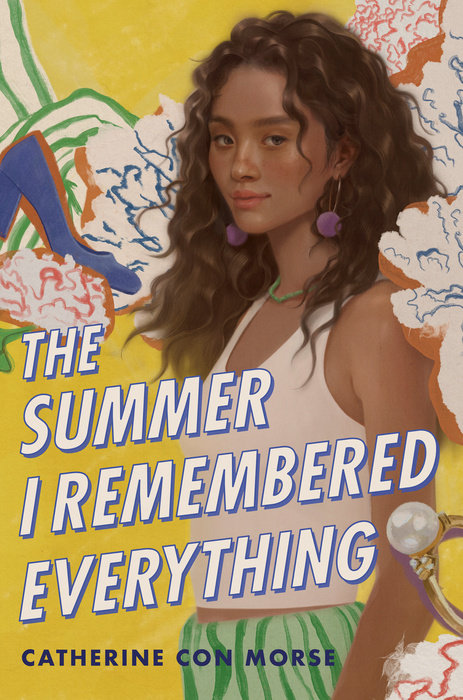The Summer I Remembered Everything
Author Catherine Con Morse
In search of a summer escape from her overbearing family, an Asian-Latine teenager becomes the mentee to a chic elderly woman. But as her mentor's memory starts to fade, the teenager is confronted with a choice that may jeopardize their friendship.
Emily Chen-Sanchez can’t do anything right. She’s been grounded for a bad grade; she can’t stop fighting with her perfect older sister; everyone’s tense because her mother’s just been diagnosed with thyroid cancer; and she hasn’t…
In search of a summer escape from her overbearing family, an Asian-Latine teenager becomes the mentee to a chic elderly woman. But as her mentor's memory starts to fade, the teenager is confronted with a choice that may jeopardize their friendship.
Emily Chen-Sanchez can’t do anything right. She’s been grounded for a bad grade; she can’t stop fighting with her perfect older sister; everyone’s tense because her mother’s just been diagnosed with thyroid cancer; and she hasn’t spoken to her best friend Matt in two weeks, four days, and about seven hours (not that she’s counting).
Her new summer job is the perfect escape: as companion to an eclectic, lively, Super Southern elderly lady, Mrs. Granucci. All Emily has to do is help Mrs. G ‘remember” her likes, dislikes, anything Mrs. G has a habit of forgetting, even Emily’s name. Emily feels closer to Mrs. G than everyone else until Mrs. G falsely accuses Emily. The betrayal will have ramifications for them both, and Emily must make a decision that will change their lives forever.
The Summer I Remembered Everything is a story of longing for an escape, finding yourself, caring for someone with an illness, and learning that sometimes the right decision is always the hardest.
An Excerpt fromThe Summer I Remembered Everything
Chapter 1
It’s the first day of summer vacation and I’m on my hands and knees in the bath-room scrubbing mildew off the tub. If only my older sister, Tessa, didn’t use so many products. There would be no gobs of her hair in the drain, no peppermint body bar melting on the soap dish, no brown-sugar face scrub all over the rim. The worst part is the quiet. No Mitski, no true crime podcast, nothing to distract me from the smell of Clorox and the occasional stray toenail clipping on our pale green bath mat.
Actually, the worst part is I have to do the toilet next.
It all started when my report card arrived.
“Psychology?” Tessa said. “How do you get a C in psychology? It’s, like, the study of yourself.”
Nothing bad ever seems to happen to Tessa. A bad day for her is like a normal one for me. But that just means I’m going to have the more interesting personality. I already do.
“Well,” I said. “Maybe I’m still getting to know myself.”
“Do you want to…
Chapter 1
It’s the first day of summer vacation and I’m on my hands and knees in the bath-room scrubbing mildew off the tub. If only my older sister, Tessa, didn’t use so many products. There would be no gobs of her hair in the drain, no peppermint body bar melting on the soap dish, no brown-sugar face scrub all over the rim. The worst part is the quiet. No Mitski, no true crime podcast, nothing to distract me from the smell of Clorox and the occasional stray toenail clipping on our pale green bath mat.
Actually, the worst part is I have to do the toilet next.
It all started when my report card arrived.
“Psychology?” Tessa said. “How do you get a C in psychology? It’s, like, the study of yourself.”
Nothing bad ever seems to happen to Tessa. A bad day for her is like a normal one for me. But that just means I’m going to have the more interesting personality. I already do.
“Well,” I said. “Maybe I’m still getting to know myself.”
“Do you want to be a walking cliche?” Tessa said.
Dad sighed. “That’s enough,” he said to her. To me, he said, “You’re grounded. Three weeks.” He stood at the bottom of the stairs while I hovered near the mid-dle, halfway to my room.
I couldn’t wait to slam the door like white kids do in the movies.
“What the crap?” I said. Not because I didn’t deserve it, but because my parents had never grounded anyone before. I was surprised Dad even knew how to ground me. In my experience, anyway, immigrant parents don’t ground; they’re so strict already. I pictured Andy Huang, who lived down the street, getting grounded and almost laughed.
“I’ll tell you what is crap,” Dad said, his accent becoming a little more prominent, like it did when he got frustrated. Is sounded like ees, and he rolled the r in crap--which would have been hilarious if he wasn’t yelling at me. He shook my report card in the air. “This is. Getting a C in this easy class!”
Under my breath, I mumbled, “It was a C plus. In Honors Psych.”
Dad started taking the stairs toward me. “Emily Chen-Sanchez, I’m not finished yet!” he said. “And don’t go into your room. Your room is too fun to be a punish-ment.”
Mom poked her head out of their room, where she’d been resting.
“. . . no respect,” I heard Tessa saying from downstairs.
I rolled my eyes. “Shut your face, Tessa!” I shouted.
To my mother, I said sorry. I was saying sorry to my mother a lot that summer, and it was still the end of May, which isn’t even technically summer yet.
“Where should she go, then?” Mom said to Dad. I couldn’t tell if she was being se-rious or making fun of the whole situation. My parents do that sometimes. They share a sense of humor that Tessa and I don’t get.
“El bano,” Dad said.
Mom laughed, like this was the funniest thing she’d ever heard.
My parents speak three languages between the two of them, and their first lan-guages--Spanish for Dad and Mandarin for Mom--always make an appearance when they’re agitated. No wonder the Spanish phrases I know are ones like saca la basura.
“Seriously?” I said.
Dad gestured toward the door, waiting for me to walk right into the bathroom that I share with Tessa.
He said I had to stay there for at least an hour, until I was ready to talk--calmly--about what had happened and the plan I would take to rectify the situation. Dad works in marketing. I’m not exactly sure what he does all day, but I know he man-ages a bunch of people who all use words like rectify.
“And give me your phone,” he said.
So into the bathroom I went. But by the time Dad came to check on me, I was painting my toenails a fire-engine red and had a sooth-ing/moisturizing/replenishing mask on my face. That was what did it. Dad handed me the yellow cleaning gloves and a sponge and said, “Scrub.”
That night, I want to take dinner into my room, but my parents won’t hear of it. That’s another thing I don’t get about them: how we can be all mad at each other, but they still want to have dinner at the table together. It’s like a subtle form of torture.
Naturally, Tessa is talking about yet another internship that she applied for. Some-thing about working in the emergency room, which is what Tessa’s been wanting to do since she was like seven.
I try not to listen. There’s only so much achievement talk you can take from some-one whose room is right next to yours. Someone whose high school CV is as long as a term paper--not to mention someone who actually has a CV in high school. Someone who delivered a TED Talk at age fifteen about the importance of good mental health among adolescents and, at age seventeen, wears her hair in a neat bob like our mom’s, partly because it’s more professional and partly because it’s efficient. Tessa is all about efficiency.
Instead of listening, I help myself to more potatoes and load them up with butter.
“Don’t eat so many potatoes,” Mom says, interrupting Tessa. “You need some green vegetables.”
“Have more pork,” Dad says. “You need protein for swimming.”
“Do you really need butter?” Tessa says. Yes, she interrupts even herself in order to nag me. She makes a point of stabbing her butterless potato and putting it into her mouth while eyeing my buttered one.
Even when all you’re doing is eating, you can count on my family to comment on your every move.
It’s when I’m feeling things super intensely that I start to have ideas for my next drawing. And it’s happening now. I’m so pissed at all three of them that I get this great sketch going in my mind: Mom, Dad, and Tessa as a family of cockatiels, sit-ting at a tiny dinner table in a birdcage, while I, larger than life as some other bird, stand outside looking in. I could title it something like When Will It Be My Turn? or Never Fitting in That Cage or simply Outside the Family. Maybe it’s too on the nose, or too Ugly Duckling, but you get the gist.
When I have an idea for a drawing, it’s like a fly buzzing around in a jar, just des-perate to get out. I feel so much better once I’ve written it down in my Notes app, or better yet--if I’m able to--I start sketching it out in pencil right away, even if it’s just on the top corner of the page I’m using to take notes in class.
Since I can’t start anything during dinner, I repeat birds, birds, birds in my head so it sticks.
Even on regular, non-grounded weekends when I don’t leave the house much, I can at least escape into my art. I put on my headphones and my art shirt (an old T-shirt) and suddenly it’s like I’m not at home at all--I’m in a real studio with exposed brick, good lighting, and other artists working around me, in somewhere like Brooklyn, where people create cool things all day.
But recently my parents have been making a stink about how much time I spend drawing. Mom doesn’t love how the chalk pastels stain my hands and nails--she wants me to use gloves, but it wouldn’t be the same--and Dad thinks that my want-ing to apply to art school is just a phase. So sometimes I take my supplies to a cof-fee shop. That’s the nice thing about pastels. You don’t need a whole lot to get set up; it’s not like watercolor, where you’ve got a bunch of brushes and paints and water and a palette.
“God, you’re so weird,” Tessa says, and I realize I must have zoned out for a bit.
Mom says, “What was that--‘Brr brr brr’?”
Dad just laughs.
That’s when it hits me: This is how it is going to be every night for the rest of the summer, and I won’t be able to bear it. Three weeks may not sound like much, but it’s nearly a third of the summer. I need to get out of this house.
I’ve never had a job before, unless you count babysitting jobs here and there. I ap-plied everywhere last summer--Marble Slab Creamery, Barnes & Noble, Publix--but they all said I didn’t have enough experience. How are you supposed to have experience if you can’t get experience in the first place? And what kind of experi-ence do you really need? I can scoop as well as anyone, and you bet I can put things into bags. Not that those jobs really interest me much. Who wants to work in a place lit by fluorescent lighting, where the most interesting thing you do is try to figure out if an herb is parsley or cilantro? What I’d really like is a job in a beau-tiful space, like in a museum or a swanky hotel, or the type of place where you wear cute shoes and take an elevator to your office. But I don’t need a fancy job. A gig doing faux calligraphy for greeting cards or drawing caricatures outdoors at eight bucks a pop would do. Honestly, I would even work in one of those paint-and-sip places, if they’d have me.
Though, as you can imagine, there aren’t many places like that in Green Valley, South Carolina, and besides, I’m not sure that I could work there if I’m not legally allowed to sip.
That night, in my room, I start scrolling for jobs on RiversEdgeRoundUp.com, our neighborhood’s online newsletter. I’m not only doing it to get out of the house. It would also be good on my resume for college (that is, if I don’t get into art school) because with mediocre grades like mine, it’ll be good to have some real-world ex-perience to back them up.
I scroll through the site, and it turns out everyone in River’s Edge needs help with something: there are ads for pet sitters and babysitters and house sitters, and plenty of ads for yard work--if you can stand working in the scorching heat and humidity. Dad won’t let me get a job like that, though. He’d say something like, We came to this country and worked our whole lives so you can always have a nice clean job inside.
Of course, the inside job should preferably be in business or medicine or law.
I ignore all the ads for sitters and tutors because I want a job where I can spend the whole day away from our house, not just a couple of hours. That way, I can still leave home while being grounded. I’m almost to the end of the ads page when I see it, a job that is perfect for me:
Lady nearing ripe old age--but not quite ripe yet--seeks a youthful companion to help with sundry things around the house. Looking for a certain je ne sais quoi. Will know it when she sees it.
The lady didn’t have an email address; you were to call the number. Payment would be discussed in person.
I close my bedroom door and dial the number.
The phone rings twice, and then a cheerful voice says, “Granucci residence!” She doesn’t sound old. But then maybe she just has a strong voice. She takes her time on the “nu” in Granucci and the “res” in residence, so that it’s like a little song.
I tell her my name and why I’m calling.
“Emily. Chen. Sanchez,” she repeats slowly, as if sounding it out, or practicing. I don’t blame her. It’s not like it’s hard to pronounce, but people get hung up on the double last name and the repetition of the ch sound, not to mention the three cul-tures in one name. “And do you like to be called Emily?” she says. “Or something else?”
“Emily’s fine,” I say. Everyone calls me Emily except Dad, who calls me Rillo (pro-nounced ree-yoh), short for amarillo, because his favorite color is yellow and he thought Emily sounded close to it. Except I’m not exactly sunshine and daffodils.
“Do you have any experience in taking care of the elderly?” Mrs. Granucci asks.
“A little,” I say, thinking of my ama, who I sometimes took walks with around the park when we visited her in Los Angeles. “Well, not really. Nothing paid, if that’s what you’re asking.” It drives Mom up a wall when I say something and then di-rectly contradict myself in the same breath. But what can I say? Everyone is full of contradictions.
“I’m still in high school,” I explain, in case Mrs. Granucci can’t hear it in my voice.
“Young,” she says. “I like that. Have you had other summer jobs?”
When I tell her I haven’t, she says, “That’s a good thing. All people want is experi-ence these days, and they end up getting robots and overeager smile machines do-ing the work for them.”
“That’s what I always say.”
Mrs. Granucci tells me to come by tomorrow at ten, that she wants to get a look at me, ask me some questions. “Will you walk here? Or drive?” Drive sounds like “drahve.”
“I’ll ride my bike over.”
“Even better,” she says. She pauses, then adds, “I don’t want to see you all gussied up. I want to see what you’re like on a normal day.”
That night, I plan my outfit, lay the options on my bed. I want to wear shorts, but it’s still an interview after all. Mrs. Granucci said not to try too hard, so I won’t wear a dress. I decide on my favorite jeans and a nice top. The jeans are pale blue and frayed on the bottom because I cut them that way, with a hole in the knee--a stylish hole. Tessa offers me one of her blazers, but it’s not that kind of job, and besides, I’m not about to let her think I need any favors from her.
When I come downstairs the next morning, Mom, Tessa, and Dad all turn toward me, the exact same expression on their faces. There are a few things that my par-ents moralize: doing your best at school is one of them, and getting up early is an-other. I have friends who sleep till noon--which is exactly what I would like to be doing--but in my family that is a strict no-no. You have to wake up by nine, and even that is frowned upon, even that is pushing it. Nine is my parents’ idea of sleeping in.
Dad is sitting at the kitchen table, stroking his thick mustache while on his iPad, having gone to the gym, showered, and taken care of a variety of household chores before I’ve even poured myself a bowl of cereal. And this is Saturday. Dad hasn’t been too keen on my looking for a job at all. His parents owned a store in Panama, so Dad grew up working there after school, and that’s partly why he doesn’t want me to work. (Why do you need a job? You have everything you need at home. You’re lucky you don’t have to work like I did!) Dad asks me to give him all of Mrs. Granucci’s information before I set out--her street address, email, and phone number--even though I’m only going to be out for an hour or less.



